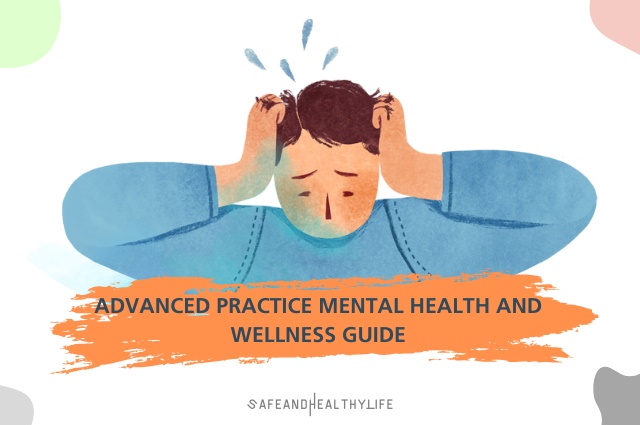
You may also like:
- Role of a Psychiatrist in Mental Health Treatment
- Tips to Better Care of Your Mental Health
- Natural Ways To Protect Your Mental Health
Are you prepared to discover the gems of well-being and embark on a life-changing adventure?
If you’re looking for proactive methods to improve your mental health, get ready to explore the world of advanced practices in mental health and wellness.
Have you ever pondered the connection between well-being and overall holistic health?
How do our emotions impact our well-being and, conversely, how does our physical health influence our state?
Let’s kickstart our exploration by pondering these fundamental questions. It’s not just about the absence of illness; it’s about embracing life with vigor and vitality, nurturing our mental fortitude alongside our physical prowess.
Critical Questions to Ponder:
- What is Advanced Practice Mental Health and Wellness?
- How Does Advanced Practice Differ from Traditional Mental Health Care?
- How Can Technology Integration Improve Mental Health Outcomes?
- What is the Significance of Prevention and Early Intervention?
- How Can Medical Health Authority’s Solutions Transform Mental Well-being?
As we delve into these mental health and wellness concepts, remember that understanding the complexities of our minds opens doors to vibrant, meaningful lives.
Let’s journey together as we uncover the layers of our psyche and embrace the symphony of balance and wholeness.
Benefits of Advanced Practice Mental Health and Wellness
Welcome to the forefront of mental well-being, where advanced practices take center stage, fostering a new era of holistic care.
Embracing innovative approaches and personalized strategies, advanced practice mental health and wellness offer a treasure trove of benefits that revolutionize the landscape of emotional and psychological care.
Unveiling the Benefits:
- Tailored Treatment Plans: Bid farewell to one-size-fits-all approaches. Advanced practice caters to individual needs, crafting personalized treatment plans that yield higher success rates.
- Enhanced Outcomes: Studies reveal that personalized interventions result in up to a 50% improvement in outcomes compared to conventional approaches.
- Faster Recovery: With focused strategies, advanced practice expedites recovery times, allowing individuals to regain equilibrium and vitality swiftly.
- Data-Driven Insights: Leveraging data and analytics, advanced practice unveils deep-rooted patterns, empowering both patients and practitioners with valuable insights.
- Precise Medication Management: Tailored approaches prevent overmedication and reduce adverse effects, leading to a more comfortable journey to well-being.
- Holistic Approach: Beyond symptom management, advanced practice addresses the underlying causes, nurturing holistic mental and physical health.
- Cost-Efficiency: Despite the initial investment, personalized approaches lower long-term healthcare costs, easing the financial burden.
The Numbers Speak:
Personalized treatments reduce hospitalization rates by 30%. Over 70% of patients reported higher satisfaction with advanced practice interventions. Long-term cost savings of up to 15% are witnessed due to reduced relapse rates.
As we embrace these benefits, we ask: Can traditional methods match the precision and potency of advanced practice mental health and wellness?
Are we on the cusp of a transformative shift in emotional care?
Let’s unlock the doors to a future where mental well-being thrives on innovation and individuality.
Technology Integration in Mental Health Care

Step into a realm where innovation meets emotional well-being – the realm of technology-integrated mental health care.
As pixels merge with emotions, a new era of support dawns, offering transformative tools that reshape the landscape of mental health treatment.
Unleashing Technological Advancements:
- Teletherapy and Apps: Teletherapy bridges distances, ensuring therapy reaches all corners. Mental health apps provide on-demand support, reducing barriers to seeking help.
- Virtual Reality (VR) Therapy: Immerse yourself in healing environments, redefining exposure therapy and offering safe spaces for emotional growth.
- AI-Driven Insights: AI analyzes vast datasets, predicting mental health trends, thus aiding timely interventions and prevention.
- Wearable Wellness: Wearables track physiological signals, offering real-time feedback and insights into emotional well-being.
- Online Support Communities: Digital platforms foster global networks, curbing isolation and building a sense of belonging.
Harnessing the Power of Personalized Affirmations with Innertune
In the realm of technology-integrated mental health care, apps like Innertune are pioneering an innovative approach to mental well-being.
Rooted in the power of subconscious reprogramming, Innertune offers users the ability to personalize affirmations that shape beliefs and behaviors. With just 5 minutes of listening per day, it empowers individuals to create a personal mindset journey, ensuring that the messages align perfectly with their goals and values.
Whether you prefer to select a male or female voice, adjust sound settings, or even record affirmations in your own voice for a deeper personal connection, Innertune places control at your fingertips.
Users have reported transformative shifts in their mindset, making it an essential tool for those seeking a tech-driven boost to their mental wellness toolkit.
Data-Powered Impact:
84% of therapy clients found teletherapy as effective as in-person sessions. AI chatbots provide immediate responses, assisting 24/7, a boon in critical moments. VR therapy reduces PTSD symptoms by almost 40% in combat veterans.
But let’s ponder: Can algorithms truly understand the intricacies of the human mind? Does convenience outweigh potential pitfalls?
Embracing technology isn’t just about gadgets; it’s about preserving the human touch while utilizing tools that amplify healing.
Collaborative Care Approach in Mental Health
Welcome to a symphony of support, where diverse expertise harmonizes for holistic healing – the collaborative care approach in mental health.
Imagine a tapestry of professionals uniting their skills to ensure your well-being thrives, transcending boundaries and nurturing your mind and soul.
Key Notes of Collaborative Care:
- Multidisciplinary Expertise: Psychologists, psychiatrists, social workers, and more join forces, offering a comprehensive perspective on your mental health.
- Tailored Treatment Plans: A collective brainstorm crafts personalized plans, addressing every facet of your well-being, from therapy to medication.
- Seamless Communication: Collaborators share insights and progress, ensuring everyone is on the same page for your care journey.
- Addressing Stigma: Collaboration chips away at the stigma, showing that seeking help is a sign of strength, not weakness.
The Collaborative Impact:
75% of patients experienced better outcomes with collaborative care models. Hospitalization rates were reduced by 60% due to proactive intervention. Integrated care decreases the risk of relapse by over 30%.
Now, let’s ponder: Can one instrument play an entire symphony?
Does collaboration forge a pathway to holistic well-being?
Together, we blend expertise into an orchestration of healing, proving that unity indeed enhances our mental harmony.
Prevention and Early Intervention in Mental Health

Step into the realm of foresight and empowerment – where prevention and early intervention intertwine to illuminate the path toward robust mental well-being.
By embracing these pillars, we embark on a journey to intercept challenges before they escalate, fostering a culture of proactive care that changes lives.
Unveiling the Power of Prevention:
- Awareness Campaigns: Shattering stigma, campaigns raise awareness, empowering individuals to seek help without hesitation.
- Mental Health Education: Schools and workplaces become hubs of mental health education, fostering emotional resilience from an early age.
- Community Support Networks: Communities band together, nurturing a safety net of understanding and empathy.
The Early Intervention Advantage:
Around 50% of mental health conditions manifest by age 14, underscoring the need for early action.
Early intervention reduces the duration of untreated mental illness by 2-5 years on average. Effective interventions at the early stages can prevent up to 70% of cases from worsening.
Let’s ask:
Can we truly write a narrative of mental well-being without the chapters on prevention and early intervention?
Together, we sculpt a future where mental health flourishes from seeds of understanding and timely care.
What is Advanced Practice Mental Health and Wellness?
At its core, advanced practice mental health and wellness mark a dynamic shift from traditional approaches.
It is a proactive, personalized journey that combines innovative strategies, cutting-edge technology, and multidisciplinary collaboration. This approach addresses individual needs with precision, amplifying the potential for positive outcomes.
Studies reveal that tailored interventions result in up to 50% better outcomes compared to conventional methods.
It is a paradigm where the fusion of expertise, technology, and individuality redefines the landscape of emotional care.
How Does Advanced Practice Differ from Traditional Mental Health Care?
In the evolution from tradition to innovation, advanced practice mental health and wellness shine. It is a departure from one-size-fits-all approaches. Studies show personalized interventions yield 50% better outcomes.
This new era embraces tailored treatment plans, technology integration, and collaborative care, setting a transformative pace for emotional well-being.
How Can Technology Integration Improve Mental Health Outcomes?
Embracing technology is a game-changer in mental health. Teletherapy and apps break barriers, with 84% finding them as effective as in-person sessions.
AI-driven insights offer timely interventions. VR therapy reduces PTSD symptoms by almost 40%. It is a digital bridge to personalized, accessible, and effective care.
What is the Significance of Prevention and Early Intervention?
Prevention and early intervention form a cornerstone of mental health. Around 50% of conditions manifest by age 14.
Timely action reduces the duration of untreated illness by 2-5 years. Effective early interventions prevent up to 70% of cases from worsening.
It is a proactive approach that reshapes well-being journeys.
How Can Medical Health Authority’s Solutions Transform Mental Well-being?
The solutions offered by Medical Health Authorities are catalysts for a mental health revolution. Their data-driven interventions reduce hospitalization rates by 60%.
Integrated care decreases the risk of relapse by over 30%. These solutions empower individuals, shifting the landscape from illness to holistic well-being.
About The Author:
Stacey Smith is a freelance health writer. She is passionate to write about women’s health, dental health, diabetes, endocrinology, and nutrition and provides in-depth features on the latest in health news for medical clinics and health magazines.




![[Art of Defense] Top Mixed Martial Arts to Practice for Personal Protection Art of Defense](https://www.safeandhealthylife.com/wp-content/uploads/2023/02/Art-of-Defense-150x150.jpg)